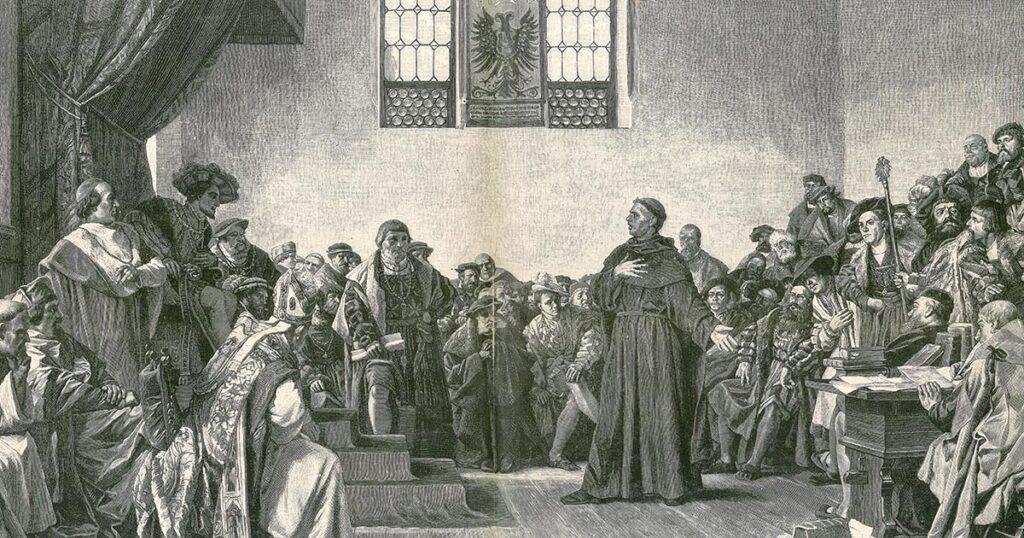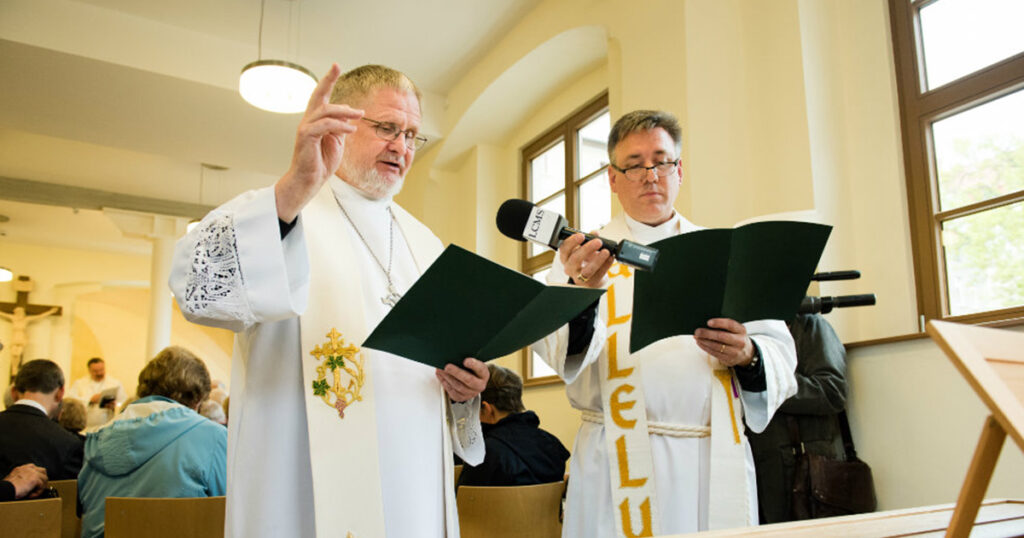By Jeffrey Kemper
On April 18, 1521, Martin Luther stood before the Holy Roman Emperor Charles V at the Imperial Diet (meeting) in the German city of Worms after having been excommunicated by Pope Leo X for teaching the pure Gospel. Luther would escape the flames that had consumed Jan Huss for his similar views a century earlier in Bohemia. He would translate the Holy Bible into German, the language of the people. His successful break from the established church would help free many Christians from the tyranny that had enveloped them.
A celebrated monk and theologue,
Condemned by pope and bishops, lords and kings,
Who soared the sacred skies on Scripture’s wings
And dared profane the pious catalogue
Of canons wrought by congresses and popes,
Now fronts the peril his conviction brings.
“I speak at your command in humble hopes
That by God’s mercy you might hear my cause.
Please pardon if my speech exhibits flaws
Inapt for courts; a monk, I learned the ropes
Of speech and script imparting simple thought
To train Christ’s folk for only God’s applause.
“The books arrayed before me I have wrought.
As to the second issue—to revoke
Them all (or else endorse them) in one stroke?
Allow me to elucidate the spot
You force me in, dear Majesty and Lords:
Perpend the varied subjects they invoke.
“Some teach of faith and deeds, that Christ accords,
So pure that my own foes do not object
But deem them fit for pious to reflect;
The selfsame view the Papal Bull awards.
I were a wretched man, should I deny
The doctrines friend and foe alike respect.
“In other writings I identify
The papal scandals that provoke and vex
The Christian world; as well, the multiplex
Of heresies and laws that fortify
The Roman coffers with the people’s wealth;
And doctrines that defy the Scripture’s lex.
“Should I revoke, I would enhance the health
Of papal tyranny; fling wide the gate
To rank impieties; ensure a spate
Of further savagery from men of stealth.
Retraction would then validate their yoke.
Good God! What malice I would obfuscate!
“In other books I write of certain folk
Who wrack the faith to safeguard Rome’s regime.
Was my attack too acrid to redeem?
I am no saint! Yet should I then revoke
These books, I’d sanction great impieties
That crush God’s people to a great extreme.
“Allow me my defense now, if you please.
Since I, but dust and ash, am prone to err,
I summon all, as Christ did once declare:
Bear witness! Prophets and Apostles—these
Should then attest. If I am wrong, let flames
Consume my books; I’ll curse them then and there!
“I am aware the dangers of my claims
And the dissensions that my doctrines breed,
Yet joy in lieu of sorrow must proceed,
For Scripture’s Gospel clearly bears these aims:
As Jesus said, ‘I came to bring not peace
Upon the earth; to bring a sword—indeed!’
“God’s wonder and His terror must increase.
Shall we arrest discords only to fight
The Word of God and tragedy invite?
May our young Emperor commence and cease
His promising and most auspicious reign,
In whom, but next to God, our hope shines bright.
“The kings of Israel and her foes did gain
Demise when they with prudent-seeming means
Secured their rule; God dethrones kings and queens.
Your Majesty, let undue wrath not rain
From all my enemies, I now beseech,
For it’s on Scripture that my conscience leans.”
. . .
“Since you require of me in simple speech,
Your highnesses, that I retract or not,
I state it now: My faith cannot be bought
By pope or council, for their overreach
Of truth and inconsistency are clear.
It is by Scripture that my faith is wrought.
“If light does not from Scripture’s chandelier
Shine brightly to convince me that I err
And could my faulty judgment not repair
To Scripture, I cannot retract. I fear
To speak against God’s Word. So here I stand;
I have no choice. ‘God help me,’ is my prayer.”
At this, the court dismissed the firebrand.
Then one week hence, protected by his prince,
He left, escaping flaming fortunes, since
He held safe-travel writ, was seized as planned,
And then interred in genial gulag
Whence Scripture soon made pope and bishops wince.
Photo: LCMS/Erik M. Lunsford





Phillip:
You must be careful. Luther did not set out to elevate “freedom” but to elevate Scripture as the source of truth.
Timothy Carter, simple county Deacon
That is true, Phillip, and the poem itself, a paraphrase on Luther’s own words, says nothing of freedom and everything of the absolute authority of Scripture. But the result is unmistakable and, I believe, undebatable: Many people were freed from the tyranny of the Roman Catholic Church.
In reality, although many left the Catholic Church, a sizable number returned after the Peasants’ Rebellion, feeling betrayed by Luther’s support of law and order and the German Princes. The Roman Catholic Counter Reformation lured some back by promising some reforms and an end to excessive tithes and the sale of indulgences and “get out of purgatory” free passes. The theological differences between Catholics and Lutherans seemed to be only of a main concern to devout believers and theologians. Many followed either denomination for political reasons and security, as German society devolved into provinces governed by Catholic or Protestant loyalists. Sectarian warfare between Protestants and Catholics over several decades resulted in much bloodletting, hurting the cause of the Gospel rather than helping to nurture it. History can be interesting, and in examining it rigorously, we find we must test our views of events in light of all relevant factors. Much good came out of the Reformation, but the price was high, and many believers died at the hands of fellow Christians. We wish the history was more pleasing, however, it was not. We are fallen creatures of a fallen race in need of God’s grace, and our noblest efforts are subject to being tainted.
Great and inspiring poem
About 2017 I purchased a video on the Reformation that added a sidelight on the Diet of Worms. Luther’s refusal to recant was the first time an individual had stood against the power of church and realm to say he could not and would not comply unless his conscience were convinced by the Word of God. That changed Western Civilization and elevated the freedom of the individual, which opened the door for people to investigate new pursuits. This has resulted in scientific investigation and new inventions we consider a normal part of life now, like technology, etc. Over the weekend I listened to a news broadcast from Germany’s ZDF TV channel. They reported on a commemoration of Luther at the Diet that took place in Worms. Lutheran Bishop Heinrich Bedford-Strohm of Bavaria and Bundes President Frank Walter Steinmeier said the same in the ZDF report. It is not just that Luther took an important stand, but he also ushered in a level of freedom not known before.